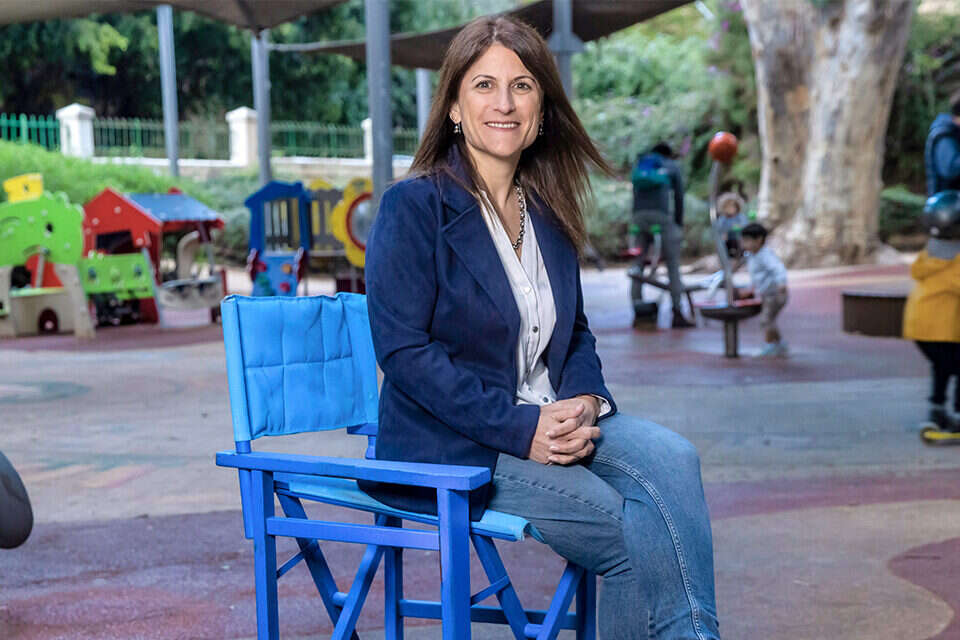Naama Esba-Foria
, Developmental Psychologist
, Associate Professor, Head of the Duet Center and Head of the Department of Developmental Psychology, Ben-Gurion University.
Caregiver at the preschool psychiatric unit at the Soroka Medical Center, and chairman of the Association for the Mental Health of the Baby
Prof. Naama Esba-Poria, this month we celebrate Family Day, a good time to talk about the stigma of the only child and to understand why it is actually not exactly true: why they are not strange or egocentric as is commonly thought.
"The stigma stems from several reasons, and perhaps it is interesting to start with the historical reason: in the agricultural period, children were considered an important workforce, and society wanted as much of them as possible - because they were an economic auxiliary force. At the time, it was more logical to think that parents would invest their resources in a few children, thus expanding the product. That is, it really wasn't customary to give birth to one child. Psychologist Granville Stanley Hall, founder of the American Psychological Association, even stated at the beginning of the 20th century that only children tend to be strange, egoistic, solitary and prone to homosexual sexual tendencies."
In those times it was actually a question of cataloging the phenomenon as a kind of mental illness. Today we witness it in a more refined way in the popular culture that sanctifies, among other things, the American dream, which includes besides a detached house or a big car - also two children.
"True. Think, for example, of the song 'Children are joy', which is another variation of the American dream. The culture you describe is the result of factors in our society that treat an only child as defective, pathological. Beyond that, in Israel there is of course the evolutionary aspect that is related to the Holocaust. Therefore, even unconsciously, we aspire to large families. There is a connection here to our collective and cultural unconscious layer, as the Jewish people. As a minority group, it is inherent in us to have many children."
Many parents also choose to have several children with catastrophic scenarios in mind, according to which one of the children will be harmed or, God forbid, die. As you said, these things are particularly relevant in a society where the Holocaust hovers over us like a shadow.
"This is an important, pessimistic point. I believe that after traumas there is a tendency to enlarge the family unit. On the other hand, there is also the parents' concern about who will take care of them in the end of their days, and a certain desire not to put the entire burden on one child. One of the most complex experiences for single children is to care in their parents during their old age. In another case, of an only child with a disability, for example, the question arises as to who will take care of him when his parents are no longer there."
Children?
It's a pollutant
With reference to the empirical data, in practice - the research on an only child is the opposite of the stigma.
"True, and maybe it's time to change the record here. Research has found that only children are more intelligent and creative, probably because their parents had more resources and leisure to nurture them. They also graduate at a higher rate of advanced degrees. In terms of personality characteristics, they are not more extroverted or introverted than the norm, no less sociable and also not lonely, selfish or unstable. So the few studies on the subject contradict the initial stigma. They also confirm that there are no more behavioral difficulties or referrals to psychiatric clinics on the part of families with only children."
But the argument is that they grow up without siblings, when they are the center of the world, which does not exactly help them later in life in integrating into different social and professional frameworks.
"Although siblings may be an advantage, there is no research evidence that only children lose from their absence. This is largely related to the parents, who play a key role here. Since we live in a society where only children are a relatively unusual situation, most parents are aware of the deficit that may arise. Thus, they The child is cared for in more intellectual, social and family frameworks. Among only children there are stronger ties with the extended family, both children and adults, and this of course may bridge gaps."
Also regarding the relationship with the parents - it is evident that it is stronger, mainly because they may invest more in their only child.
"By virtue of being an only child, his parents may experience less stress, compared to dealing with two or more children. Given several siblings, the burden on the parents increases. On the other hand, the parents of an only child may be more free and available to him. As you mentioned, the parental investment in him increases, everything directed at him, and therefore, for the most part, these are very well-groomed children, but as mentioned, not necessarily more egocentric or with distinctly different personality layers than the average."
Why do parents, in the first place, bring only one child today? Out of financial necessity or maybe out of other desires?
"It's about a combination. Sometimes it's about an informed choice, and sometimes it doesn't depend on them at all. Immigration from the former USSR was characterized, for example, by a culture of having one child.
The parents went to work, and the grandparents raised the children.
Nowadays I recognize another, somewhat surprising trend - ecological.
Parents who choose not to have more children because they hold the position that their upbringing pollutes the environment.
According to them, one child is enough.
It's a trend I recognize in Europe, and it's starting to gain momentum here as well."
What family patterns can be identified among only children? Do they choose to build larger families later in life or rather continue the trend in which they grew up?
"Usually they choose to have several children, and do not recreate their childhood experience, because it is important for them to feel a significant sense of belonging to a larger group. Psychoanalyst Donald Winnicott said that there is no baby without a mother; Fox, the father of group analysis, said that there is no person without a group. Indeed, we are social, group creatures."
By the way, what is the stigma on parents of only children, how much do they suffer from it and how true is it?
"The stigma is that of a flaw, an imperfection. Accordingly, in many families where there is only one child, the emotional work of the parents is required to shake off this stigma. Without a perceptual-emotional change, there is a danger that the parent will feel that he is depriving the child of a full family life, and thus will live in the shadow of guilt."
If we consider this scientifically, in order to maintain happiness and financial well-being, it is better not to have children at all or to be satisfied with one child at most. What should parents think about when they are debating whether to bring another child into the world today, a second child or even a first child?
"The research shows that the level of happiness among parents increases after the birth of the first child, especially in the first two years, and remains high with the second child, but decreases with the third child. The cumulative burden on the family system apparently has an effect. However, it is important to take into account that there are many other factors, and therefore The answer is individual."
Laboratory as preparation for life
You mentioned earlier that siblings might be an advantage. What is actually that advantage?
"Siblings definitely contribute to the child's development, and enable the practice of emotional strengths and social confrontations in a relatively safe environment. This is an opportunity to develop children's communication skills, their emotional expression. Fights and competition between siblings, which are inevitable, develop greatly when there are parents who mediate the situation. Children Little ones imitate their older brothers, who serve as role models for them. On the other hand, a first-born facing the birth of a sibling may experience a difficult crisis, and only children do not have such challenges, for better or for worse."
Beyond that, these are also the longest relationships we have in our lives.
"It's something we don't think about. It's customary to think that relationships with our parents are the most significant, but in fact, sibling relationships accompany us many times over the years and often cause extreme emotional intensity."
which can be seen, for example, already in the Bible.
"And the Bible, as in the example of Cain and Abel, does indeed bring us sibling relationships in their full force. Jealousy around the parental resource and parental love is a critical mental engine in human development. When there are siblings we develop 'opposite', And the comparison is always present. The birth of a younger sibling causes the eldest, for example, to behave differently. Suddenly they have to show patience, empathy and even sophistication. This social laboratory that is created within a family allows siblings to see the other, learn, and later go out more prepared for similar interactions."
Also regarding the siblings, is there a connection between birth order and intelligence, as is commonly thought?
"It is true that first-borns have a slight advantage in intelligence over their brothers due to the exclusive and initial parental investment, but all the other qualities that are usually associated with children according to birth order - are myths. People enjoy using them because sometimes they get along with reality."
choose the narrative
The average in Israel is 2.8 children per family. How did we get to this number?
"Ultimately, the reason is quite prosaic and related to the herd phenomenon: it is no coincidence that almost all the mothers in the same kindergarten become pregnant at the same time. As humans, we tend to behave similarly. By the way, this number matches the middle class: the lower the income and education levels, the lower the birth rate grows up".
Come to think of it, three isn't exactly a balanced number. In a family, one of the ribs may be left alone.
"That's true. In this sense, it makes more sense to have two or four children. In the past, the trend was towards four children, but this number is small due to economic considerations, and due to the fact that parents, especially mothers, began to develop their careers more and more. As women's status rose , and increases, the number of children decreases."
From your words it sounds like the number of children will continue to decrease.
"In my opinion, the average will stand at two children in the not too distant future. This trend has already begun, and it is related, beyond the economic aspect, to the parents' desire to be 'perfect' in addition to being career people. The mother's investment is more limited today, so her ability to invest in more and more children - is decreasing."
And what about the fathers?
"This is an interesting phenomenon. If in the past we saw 'weekend fathers', careerists who arrive in the evening, today we can identify more fathers who protest and want to be at home with their children, and express frustration that they are not at home for quality time with the children, and during bedtime. This is a welcome change, which they shared Related to Corona".
What about sibling differences? Large gaps are also a recipe for complexity.
"A study we recently conducted in Israel on the birth of the second child revealed that the common gap between births in Israel is about one and a half to three years. Along with this norm, there are quite a few cases where children are born after a large gap from their siblings. Usually it is a child who was born 'at the last opportunity,' And often referred to as 'the icing on the cake'.
"Young children who grow up with a considerable difference from their brothers often describe themselves as only children. Their brothers are already older, and they do not have strong emotional experiences related to siblings. Here too, similar to only children, they may experience sadness and jealousy that the feeling of 'togetherness' was absent from their lives. To some extent, this is a common feeling among some only children: they want a little brother or sister because they feel outside the group."
The new family structures in Israel raise additional points related to groupness, identity.
"This is a question - what are siblings even today? Are these two children born to the same parents? It used to be clear that siblings were the children of the same parents. Today this is not the case, and as evidence there are cases, in same-sex families for example, where two 'siblings' were born from a seed of the same person to two different mothers, or 'siblings' born from the seed of different men to the same mother. There are countless combinations. This is a different biological relationship than the one we are used to. So beyond the question of the only child, today, brothers ask - what is our relationship to each other?" .
What is the answer given to children in such cases?
"On the psychological level, one of the most important things is how the child is told the story of who he is. It is crucial here for parents to stop and observe their feelings and thoughts. This is called reflective ability. The ability to observe and understand oneself and the other. This is a basic ability that creates confidence in the parent-child relationship. child. My research shows that parents who are more reflective, better help their children get to know themselves, thus helping them develop self-confidence and a better self-image."
When the narrative is not clear, the feeling of missing out passes to the child and may paint his life in gloomy shades.
"True. When the parents put the disadvantage first, it increases. Since parents of only children grow up in a society that is full of stigmas from the beginning, it is important that they conduct a deep and responsible discussion on the subject, and formulate the position that will be presented to the child, in such a way that he will grow up to be a healthy and functioning adult in society."
For suggestions and comments: Ranp@israelhayom.co.il
were we wrong
We will fix it!
If you found an error in the article, we would appreciate it if you shared it with us




/cloudfront-eu-central-1.images.arcpublishing.com/prisa/U2R7NZPI4CFAXSB3RA5IFUE2VE.jpg)









